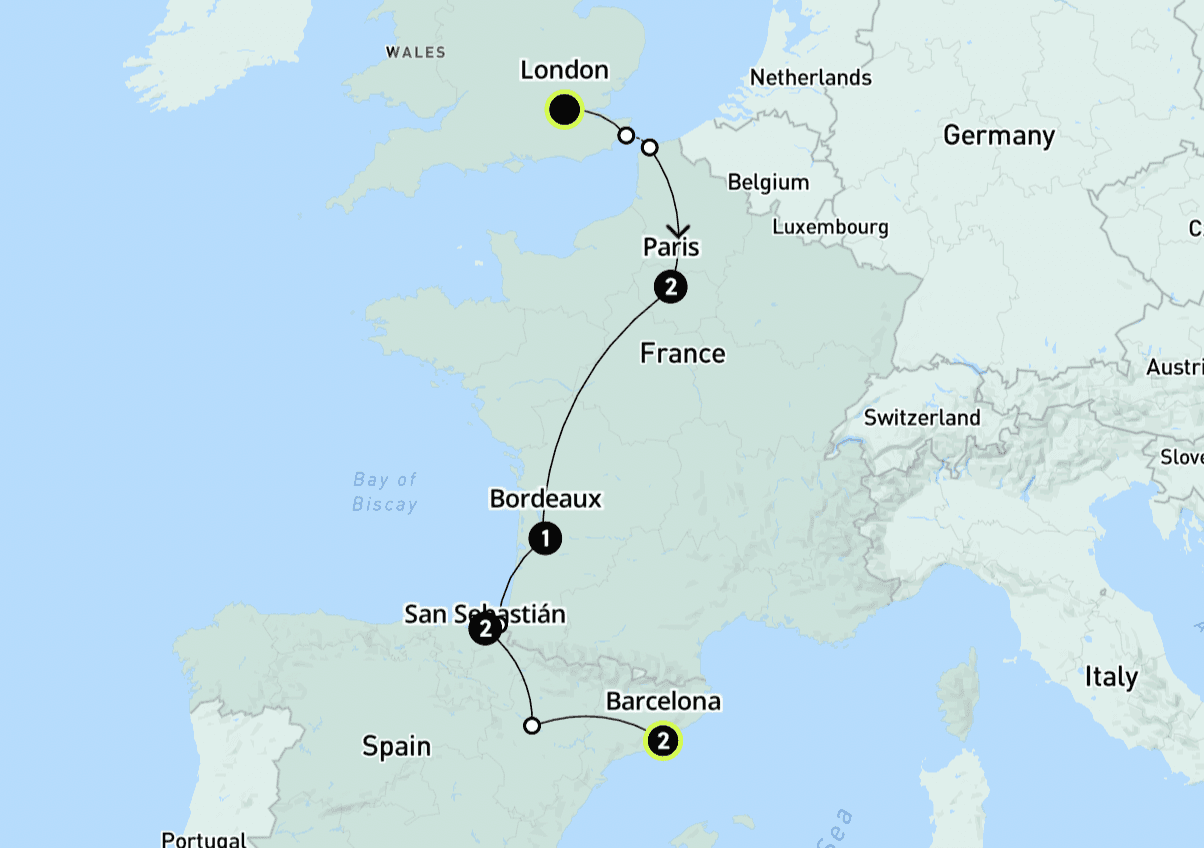Imagine working remotely while enjoying Spain’s vibrant culture, sunny beaches, and historic charm. With the Digital Nomad Visa, this dream can become reality in 2025.
Spain’s visa program is attracting global talent, ranking among the top 10 destinations for digital nomads due to its affordability, lifestyle, and connectivity.
This guide provides a clear, step-by-step checklist covering everything from eligibility and required documents to settling into your new Spanish life.
Bookmark this guide and start checking off the steps today—your adventure in Spain awaits in 2025!

Spain’s Digital Nomad Visa is a golden opportunity for remote workers, freelancers, and entrepreneurs to legally reside and work in one of Europe’s most beautiful countries. Launched to attract global talent, the visa offers benefits such as a 24% flat tax rate under the Beckham Law, access to Spain’s healthcare system, and the chance to explore the EU during your stay.
Whether you’re drawn to the cosmopolitan vibe of Madrid, the beaches of Barcelona, or the charm of Seville, this visa could make your dream of living and working in Spain a reality.
Step 1: Confirm Your Eligibility
Before starting your application, it’s essential to ensure you meet the key eligibility requirements:
Remote Work: You must work for a company based outside of Spain or operate as a freelancer serving international clients.
Income Requirements: You need to demonstrate a steady monthly income of at least €2,520 or €30,240 annually.
Employment Proof: Provide evidence of your remote work arrangement, such as a contract or employer letter.
Review your current income and employment situation to ensure you meet these standards. If you’re self-employed, gather documentation that highlights your client base and ongoing contracts.
Spain is known for its vibrant cultural celebrations—be sure to check out our Spain Festivals 2025 guide to plan your trip around the best events.
Step 2: Gather Your Documents
Having the correct documentation is crucial for a smooth application process. Here’s a checklist of what you’ll need:
Valid Passport: Ensure your passport has at least six months’ validity from the date of application.
Proof of Employment: This could include contracts, a letter from your employer, or evidence of ongoing freelance projects.
Police Clearance Certificate: Obtain a certificate from your home country confirming you have no criminal record.
Proof of Income: Bank statements, pay stubs, or tax returns showing a consistent income above the required threshold.
Health Insurance: Private health insurance covering you during your stay, valid across Spain.
Accommodation Proof: Documentation such as a rental agreement, hotel booking, or an invitation letter if staying with friends or family.
Start collecting these documents as early as possible, as some may take time to obtain (e.g., police clearance).

Step 3: Translate Documents into Spanish
Spain requires all official documents to be in Spanish or accompanied by a certified translation. This includes:
Police clearance certificates.
Employment contracts or verification letters.
Proof of income.
Hire a sworn translator certified in Spain to ensure your translations meet official standards.
Whether you're a digital nomad or a casual traveler, these 10 travel hacks will improve your experience.
Step 4: Apply for Your NIE (Foreigner Identification Number)
The NIE, or Número de Identificación de Extranjero, is a must-have for foreign nationals in Spain. It’s required for almost everything, from opening a bank account to signing rental agreements.
How to Get Your NIE:
Complete the EX-15 application form (available online).
Book an appointment at your nearest Spanish consulate or a police station in Spain.
Bring your passport, a copy of your visa application, and proof of the reason you need the NIE (e.g., a letter of intent for the visa).
If you plan to apply for the NIE in Spain, schedule your appointment as soon as you arrive, as spots fill up quickly.

Step 5: Research Health Insurance Options
Spain requires private health insurance that provides full coverage without co-payments during your stay. Your plan must be valid throughout Spain and meet visa requirements.
How to Choose the Right Insurance:
Look for insurers like Sanitas or Mapfre, which offer plans tailored to visa applicants.
Ensure the policy includes coverage for emergencies, hospitalisation, and routine care.
Confirm that the insurer provides a policy certificate in Spanish.
Contact multiple insurers for quotes and confirm your chosen plan meets all visa requirements.
Step 6: Book an Appointment with Your Local Spanish Consulate
You’ll need to submit your visa application in person at a Spanish consulate in your home country. Each consulate has its own process, so check their website for specific instructions.
How to Book:
Visit your consulate’s website and navigate to the visa section.
Select the Digital Nomad Visa category and follow the instructions to book an appointment.
Prepare all necessary documents (refer to Step 2).
Book your appointment early, as slots fill up quickly, especially in major cities like London or New York.
Looking for a unique winter experience in Spain? Our Spain Christmas Markets December guide will help you explore the most enchanting holiday markets.
Step 7: Complete the Visa Application Form (EX-01)
The EX-01 is the official application form for the Digital Nomad Visa. It requires detailed information about your personal details, employment, and intended stay in Spain.
How to Fill It Out:
Download the form from the Spanish consulate website.
Use block letters to ensure clarity.
Attach additional sheets if you run out of space for details.
Double-check for errors before submission to avoid delays.
Step 8: Prepare for Your Consulate Appointment
On the day of your appointment, you’ll need to submit your application and may be required to answer questions about your work and plans in Spain. Be ready to discuss:
Your income and how you’ll support yourself.
Your intention to live in Spain temporarily, not permanently.
Your ability to comply with visa requirements.
Arrive early and bring both originals and copies of all documents.
Planning an extended stay in Spain? Make it a luxury escape by following our Luxury Holidays in Spain 2025 guide for the best exclusive experiences.
Step 9: Submit Your Application and Pay Fees
Once you’ve gathered your documents and completed the EX-01 application form, it’s time to submit your application at the Spanish consulate.
What to Expect During Submission:
The consulate staff will review your documents to ensure everything is in order.
You may need to clarify aspects of your application, such as your income source or work arrangement.
Visa Fees:
Fees typically range between €80–€100, depending on your nationality and consulate.
Check your consulate’s payment options (cash, card, or bank transfer).
Keep extra copies of all documents in case anything is misplaced during the submission process.
Step 10: Attend the Visa Interview
Some consulates may require an in-person interview to confirm your application details and assess your eligibility.
Common Questions Asked During the Interview:
Why do you want to live in Spain?
What kind of work do you do, and how does it qualify as remote?
How will you support yourself financially?
Do you intend to bring family members with you?
Be honest and confident in your responses. The goal is to demonstrate that you meet all the requirements and have a clear plan for your stay in Spain.

Step 11: Wait for Visa Processing (30–60 Days)
Once your application is submitted, the consulate will process it, which typically takes 30–60 days. However, this timeframe can vary based on your consulate and the completeness of your application.
Tracking Your Application:
Some consulates offer online tracking, while others will notify you by email or phone.
If there are delays or additional requests for documents, respond promptly to avoid setbacks.
Use the waiting period to finalize your relocation plans, such as researching accommodation, healthcare providers, and transportation options in Spain.
Step 12: Plan Your Arrival in Spain
Once your visa is approved, you can begin planning your move. This step involves key preparations to ensure a smooth transition.
Pre-Arrival Checklist:
Book Your Flight: Choose a flexible ticket in case of unforeseen delays.
Arrange Temporary Housing: If you haven’t secured a long-term rental, book an Airbnb or short-term rental for your first month.
Prepare Essential Documents: Bring all originals, as you may need them for tasks like registering with local authorities or opening a bank account.
Research transportation options in your destination city—Spain’s train and metro networks are excellent for getting around.

Step 13: Register with the Local Town Hall (Empadronamiento)
After arriving in Spain, one of the first tasks is registering your residence with the local town hall. This process, called empadronamiento, is essential for:
Accessing healthcare.
Enrolling in language courses or schools for dependents.
Completing tax registrations.
How to Register:
Make an appointment at your local Ayuntamiento (town hall).
Bring proof of residence, such as a rental agreement or utility bill.
Provide your NIE, passport, and visa.
Some towns may allow walk-ins, but appointments are safer. Call ahead to confirm requirements for your area.
Planning a long-term luxury stay in Spain? Check out Luxury Escapes to Spain 2025: My Insider’s Guide to Avoiding the Crowds for the best quiet spots to live, work, and unwind
Step 14: Open a Spanish Bank Account
A Spanish bank account is essential for paying bills, managing your finances, and meeting certain residency requirements.
Top Banks for Expats:
Santander: Offers accounts tailored to foreigners.
BBVA: Known for its easy-to-use digital banking platform.
CaixaBank: Popular for its customer support and English-speaking services.
N26: Perfect for digital nomads, super easy to set up from home.
What You’ll Need to Open an Account:
Passport and NIE.
Proof of address (rental contract or empadronamiento).
Initial deposit (varies by bank).
Actionable Tip: Research online reviews to find the bank that best fits your needs, especially if you need English-language services.

Step 15: Understand Spain’s Taxation System
Living in Spain for more than 183 days in a calendar year makes you a tax resident, meaning you’ll need to declare your worldwide income. However, Spain’s Beckham Law offers significant benefits for digital nomads.
Beckham Law Benefits:
A flat 24% tax rate on income up to €600,000.
Exemption from taxes on foreign income in certain cases.
Consult a tax advisor to understand your obligations and how to take advantage of the Beckham Law.
Step 16: Enroll in Spain’s Healthcare System (Optional)
While private insurance is required for your visa, you may also want access to Spain’s public healthcare system. After registering your residence, you can:
Apply for a Tarjeta Sanitaria Individual (health card).
Use private insurance for additional coverage.
Compare the costs and benefits of public versus private healthcare once you’ve settled in Spain.
Step 17: Explore Spain’s Digital Nomad Communities
One of the best ways to integrate into Spanish life and find professional opportunities is by joining digital nomad communities.
Top Resources for Networking:
Facebook groups like “Digital Nomads in Spain.”
Platforms such as Meetup and NomadList.
Local coworking spaces, which often host networking events.
Start networking online even before you arrive to get insider tips and recommendations.

Step 18: Apply for Visa Renewal (If Needed)
Spain’s Digital Nomad Visa is initially valid for one year, with the option to renew for up to five years.
How to Renew Your Visa:
Begin the renewal process 60 days before your visa expires.
Gather updated documents, such as proof of income, health insurance, and accommodation.
Submit your renewal application to the local immigration office (Oficina de Extranjería).
Keep detailed records of your finances and employment throughout the year to make the renewal process smoother.
Step 19: Bring Your Family Along
The Digital Nomad Visa allows you to bring dependents, such as a spouse, children, or other family members.
Requirements for Family Members:
Proof of relationship (e.g., marriage or birth certificates, translated into Spanish).
Additional income: You’ll need to earn an extra 75% of the monthly income requirement for your first dependent and 25% more for each additional dependent.
Comprehensive health insurance for all family members.
Plan for family-specific needs, like finding schools or childcare in your chosen city.
Step 20: Set Up Utilities and Get Connected
Once you’ve settled into your accommodation, you’ll need to set up essential utilities like electricity, water, and internet.
Quick Tips for Setting Up Utilities:
Many landlords include utilities in rental agreements, so confirm with yours first.
For standalone accounts, prepare your NIE and proof of residence to sign up with utility providers like Endesa (electricity) or Movistar (internet).
Spain’s free public Wi-Fi spots are common, but having reliable home internet is essential for remote work.
Step 21: Learn Basic Spanish
While many Spaniards in urban areas speak English, learning some Spanish will make your daily life and interactions easier.
Tips to Learn Spanish Quickly:
Use language apps like Duolingo or Babbel.
Enroll in local language classes, often offered at affordable rates by town halls (Ayuntamientos).
Practice with locals and immerse yourself in the culture.
Actionable Tip: Start with essential phrases for ordering food, asking for directions, and handling simple tasks like grocery shopping.
Spain is home to a growing number of coworking spaces tailored to digital nomads. These spaces offer reliable internet, networking opportunities, and a sense of community.
Top Coworking Spaces by City:
Barcelona: Cloudworks, Aticco.
Madrid: Utopicus, The Shed Co.
Valencia: Vortex Coworking, Wayco.
Many coworking spaces offer day passes—try a few to find the vibe that suits you best.

Step 23: Discover Spain’s Digital Nomad Hotspots
Spain offers an incredible variety of destinations for digital nomads, from bustling cities to serene beach towns.
Top Locations to Consider:
Barcelona: A cosmopolitan hub with vibrant culture and excellent connectivity.
Málaga: A sunny coastal city with a laid-back lifestyle and affordable cost of living.
Valencia: Known for its beaches, modern infrastructure, and thriving expat community.
Canary Islands: A tropical escape with warm weather year-round and tax incentives.
Spend time in different cities before committing to a long-term location.
Step 24: Understand Spain’s Public Transportation System
Spain’s public transportation is efficient, affordable, and well-connected, making it easy to explore your new surroundings.
Options to Know:
Trains: Renfe operates high-speed trains (AVE) and regional services connecting major cities.
Buses: Alsa and other companies offer affordable intercity bus travel.
Metro Systems: Found in cities like Madrid, Barcelona, and Valencia.
Get a transportation card, such as the T10 in Barcelona or the Abono in Madrid, for cost-effective local travel.
Step 25: Comply with Local Tax Obligations
Staying tax-compliant is critical for avoiding legal complications while living in Spain.
Key Points to Remember:
If you live in Spain for over 183 days in a calendar year, you become a tax resident.
The Beckham Law offers a reduced 24% tax rate on earnings up to €600,000 annually for the first six years.
Freelancers may need to register with the Spanish tax authorities and submit quarterly tax filings.
Hire a tax advisor familiar with Spain’s laws to manage your finances effectively.

Step 26: Network and Build Your Community
A strong support network can make your digital nomad experience much more enjoyable. Spain offers plenty of opportunities to meet like-minded professionals and locals.
Ways to Build Your Community:
Attend networking events at coworking spaces.
Join Meetup groups and Facebook communities.
Participate in cultural festivals and local events.
Building connections early can help you discover hidden gems, professional opportunities, and insider tips.
Step 27: Explore Spain’s Culture and Lifestyle
Living in Spain isn’t just about work—it’s an opportunity to immerse yourself in its rich culture.
Must-Try Experiences:
Savor local cuisine like paella, tapas, and churros con chocolate.
Attend cultural events such as La Tomatina or Semana Santa.
Visit iconic landmarks like the Sagrada Familia in Barcelona or the Alhambra in Granada.
Actionable Tip: Dedicate weekends to exploring different regions—each has its unique charm and traditions.
FAQS Travel to Paradiso
Recent Posts
















